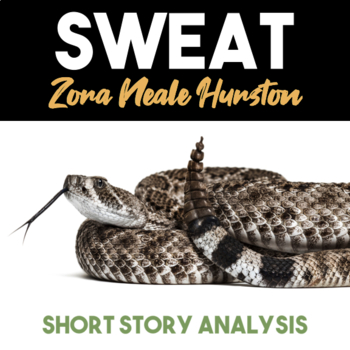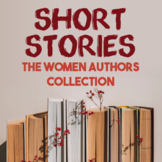Sweat by Zora Neale Hurston | Short Story Analysis
- Zip
Also included in
- In this bundle, you will receive lesson plans for 7 short stories all written by Black authors. With each product, there are detailed literary analyses, reading questions, answer keys, and accommodating activities. Diversify the literature in your classroom and use these stories to broaden your studPrice $10.99Original Price $13.93Save $2.94
- This bundle includes five short stories by women authors—perfect for celebrating Women's History Month and diversifying literature in your classroom. These stories fit nicely into any short story unit for high school or upper middle school students. The Yellow Wallpaper by Charlotte Perkins GilmanDePrice $7.99Original Price $9.95Save $1.96
- The Female Authors Collection — 15 Short Stories Written by Women, perfect for Women's History Month!1) The Hitchhiker by Lucille Fletcher 2) Fish Cheeks by Amy Tan3) Geraldine Moore the Poet by Toni Cade Bambara4) The Scholarship Jacket by Marta Salinas5) The Third Wish by Joan Aiken6) The Yellow WPrice $19.99Original Price $29.85Save $9.86
Description
Use the short story "Sweat" by Zora Neale Hurston to teach Feminist Literature, Famous African American Authors, or about Themes and Biblical Allusions in literature. This is a great lesson for students to practice literary analysis.
Included in this lesson plan:
- Full Text "Sweat" short story by Zora Neale Hurston
- Anticipation activity, activating strategy worksheet
- Powerpoint presentation:
- Background Information about the author Zora Neale Hurston
- Historical Context: Rural America in the South during the 1920s, Racism, Slavery, and African American Vernacular English
- Academic Vocabulary and Definitions from the story
- Academic Vocabulary Graphic Organizer
- Literary Analysis Questions and Answer Key
- Discussion Questions for cooperative learning and Answer Key
- After Reading Theme Analysis Chart with constructed response and Answer Key
- Biblical Allusions Graphic Organizer with constructed response and Answer Key
- Journal Prompt to form personal connections to the text and characters
File Types Included:
Teacher Guide and Answer Keys (PDF)
Author Bio and Vocabulary (Powerpoint Presentation)
Student Copy of Activities (PDF—ready to print)
Student Copy of Activities (Word document—editable for teachers)
YOU MAY ALSO LIKE!





